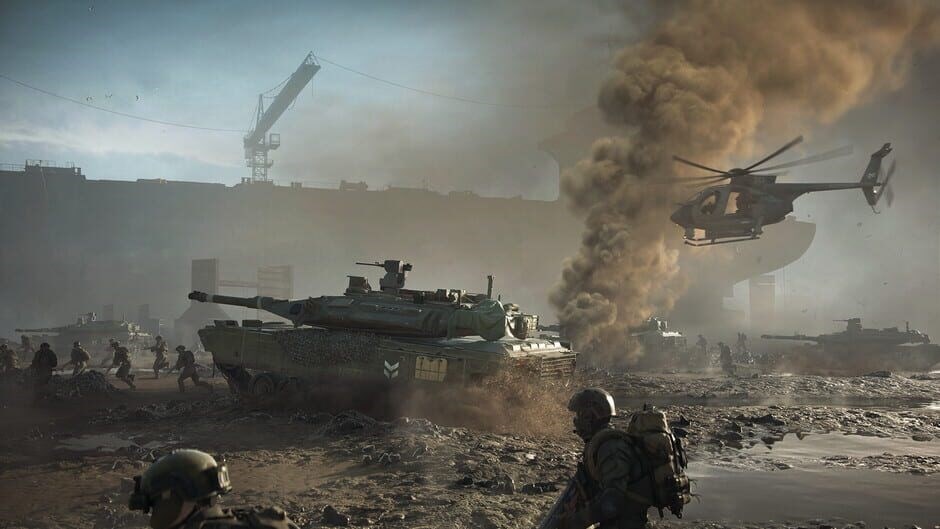It is not often that I buy into the mood of the hivemind over at Reddit. But it is everywhere. Even popping over to Twitter for gaming news and commentary is like watching a mob ready up their pitchforks. There are multiple theories on what should happen with the gaming industry; younger gamers are despondent and feeling let down, where those of us who experienced the golden age of gaming first hand can remember what it was like to trust a publisher or developer. It seems that trust has broken down, and we can chart where most of it went "wrong" for the gaming industry by just taking a look at the last few years of drama.
Whilst this article will surely give you pause for thought, it should not feel like we're wallowing in our own self-pity. There are some huge positives to look forward to in PC gaming, and we're definitely going to cover that. With E3 2021 such a let down for most gamers, and the biggest publishers seemingly rubbing greedy hands instead of focusing on quality development, it has been a tough few years for both younger and older gamers. These are two very different types of gamer, too, for the most part.
One the one hand you have the younger generation who look forward to a AAA release throughout development, and spend £60 or more on pre-ordered special editions, buying something that turns out to be unfinished or broken. Then you have the older gamer who does not have a lot of time to play games, and looks forward to that AAA release because it will no doubt be their daily obsession after work, and they are disappointed for different reasons. There are lots of other demographics we can't even hope to cover, but what it boils down to is a sea of negativity that most gamers are struggling to wade out of.
Where It All Went Wrong
It would be very easy to make a sweeping statement based on games we like or dislike - CoD vs Battlefield is a great example - but that is just based on taste. It would also be easy to say "Microtransactions have ruined gaming!", but Investopedia estimates "only 5 to 20% of game communities take part in microtransactions, and the amounts they spend vary", so we can't say the blame lies there for games in general. We also cannot draw any conclusions from the Cyberpunk 2077 or Anthem launches, or the recent debacle that is GTA Definitive Edition, as these are significant problems in their own right. Reddit would have you believe that the gaming industry is currently just out for your money, doesn't care about you, and will churn out any old rubbish.
The recent backlash for games like Battlefield 2042, which had around 29,000 negative reviews two days after release, it is plain to see that gamers can retrospectively see through the thinly veiled money-grab, but never know which game will result in disappointment. Games like this are difficult to talk about in a conversation about "what is wrong with the gaming industry?", but a lot can be said for waiting until release before buying, and reading/watching unbiased reviews.

For every gamer, their Golden Age of Gaming is going to be different to the next person. What we do know is that there have been certain moods or sentiment in the gaming world that cannot be ignored. In the past, there was an element of trust in developers and publishers, and the world of gaming felt more like a community at certain points in time. To examine where it all went wrong, we have to take into account the many different genres of gaming, and their various positives and negatives over the years. With all that said, there is a particular part of the evolution of gaming where most people can agree things started going wrong: game size and complexity.
The size and developmental complexity of a game directly affects the finished product, and the sentiment of the market it will penetrate. We should be able to expect certain things from a game i.e. we should always receive the experience the developer and publisher says they will deliver, because that is what we're actually paying for. We're not paying to play an exact replica of the early trailer, because we know this is just a reveal to whet our appetite. No, we are paying to experience the game that is pitched to us, and nothing more. Graphics, soundtrack and everything else aside, the experience is what counts in games.
If we look at games that were pitched as offering a specific experience, and we were left wanting by the final release, we can usually chalk it up to the size and complexity of the game itself, and the developer's inability to deliver on that. Ergo, the experience is terrible because we don't feel how we thought we'd feel.
The Curious Case Of Sean Murray
The more ambitious games became, the worse our experiences got. No Man's Sky is a great example of this in action. Whilst followers of the development process were looking forward to having such a massive expanse of procedurally generated universe at their fingertips, and being able to explore to their heart's content, it turns out that can become quite boring eventually. Three years of hype and salivation later, the developers, Hello Games, delivered most of what they promised, and players were unhappy.
The biggest criticism of No Man's Sky was that it did not live up to the image that founder and managing director, Sean Murray, had painted. For three years Murray was very vocal about what the game would have in store for the clamouring sci-fi fans it attracted, but it would seem he went a little bit too far. A Redditor made a list of all the Murray's quotes from interviews about what people could expect from No Man’s Sky, and then cross-referenced it with what was actually in the game. There was glaringly obvious disparity. This does not warrant death threats for missing butterflies, of course. Which actually happened.
“I remember getting a death threat about the fact that there were butterflies in our original trailer," Murray told The Guardian in 2018."
for 20 hours, you probably got the experience that we wanted. But you probably would have never picked up No Man’s Sky again.”The game was in development for five years up until launch in 2016, and No Man's Sky NEXT launched in 2018 to rapturous positivity by the fans who stuck by the game and Hello Games. This update along with countless others has turned NMS into a cautionary tale for small development teams who think too big.
Big, Bigger, Biggest
Size and complexity may be an issue for smaller studios, but should not be for big companies like CD:PR, Ubisoft, EA or Rockstar. What the gaming public is feeling right now is a vast gap between how they thought they would feel, as opposed to how they actually feel about a game. The experience does not align with the emotions they felt at the announcement of the game, or through each one of the reveal trailers on the run up to launch. Expectation vs. reality.
Developers are fighting the battle against the demands of the gaming public and the publishers who have laid their cash on the line. After eight years of development, Cyberpunk 2077 was released, and we were sold a broken and unplayable game on most consoles and PCs. This should have been impossible, considering CD Projekt Red's pedigree (The Witcher Series), but poor budgeting and terrible planning led to one of the biggest releases becoming a flop and being removed from sale on PlayStation Store. With over 8 million pre-orders, the hype was palpable after E3 2019, where it was announced alongside a very excitable Keanu Reeves appearance, that the game would be out as early as April 2020. The staff at CD:PR were shocked at this release date, and knew it couldn't be done. An unfortunate side effect of corporate entities deciding on product timelines is the fact that it affects human beings. The development crunch of Cyberpunk 2077 was a sorry affair which saw the game set back a few times, despite regrettable six-day work weeks, and long hours on the devs.
The management at CD:PR had let their staff down by not understanding the scope of the project itself, and the size and complexity eventually was its downfall. The sheer volume of assets and components that are compacted into small areas in the game means there is huge demand on the hardware, and this was also difficult to deal with on consoles (last gen or next gen). Night City is a vast landscape that is limited to a relatively small space (systematically speaking), and with the ability to interact with so many of the resident components - being an RPG at its core - Cyberpunk 2077 is a programmatical nightmare. With multiple story arcs and outcomes throughout the game, this created exponential problems throughout the crunch and beyond.
Even now, a year on, with updates and patches made available, the game is still some way from being completed and ready for DLC drops. However, the experience of gamers who can see the game for what it is - a massive RPG - is a positive one. This juxtaposition is incredible, considering the negativity that surrounds Cyberpunk.
The story, unique combat, expansive open-world setting and detailed RPG element is simply fantastic for fans of this genre. By ignoring glitches and bugs, players have gone on to love the game regardless.
The Golden Age Of Gaming: Est. 1972
Right now we are able to offer the most incredible game engines for free to game developers, with Unreal engine and Unity being the most popular. With tenacity, dedication and creativity, impassioned game creators can pick up these game engines and create what looks and feels like a AAA game on a budget of next to nothing. Similarly, smaller studios and huge companies can undertake projects at scale and create amazing games in a short space of time - or take their time over a masterpiece.
We are currently living in the Golden Age of Gaming, and have been since Pong in 1972. Every year that passes becomes a leap ahead for gaming in one way or another, and it is impossible to predict what game will sell in crazy numbers or garner millions of YouTube creators' praise and coverage, because the same principles apply now as they did back in 1972. The formula for success is not in how pretty a game is, or how big it is, or even how many pre-orders it gets. The actual formula is much simpler: if a game is entertaining, then it will succeed. If a game is capable of eliciting fear, happiness, adrenaline, sadness, excitement or any one of a number of feelings or emotions, then the developer has done their job right, and will be rewarded by the natural order of things.
Credit: JackSepticEye
Right now, in the digital age, it is virtually impossible for something popular to escape your attention, regardless of how you ingest your gaming news. Social media passes information around like an epic word of mouth machine, and this travels offline in conversation, delivering bite size information worldwide in a matter of seconds. A game played by JackSpeticEye on YouTube today can sell multiple thousands tomorrow, and be picked up by dozens of YouTubers just so they don't miss the trend. If a game in your favourite genre becomes popular, then you will hear about it. This fast track to success has been experienced by a number of small and large studios, but it is important to understand that this success is never guaranteed unless the game itself is worthy.
Last Word
I'm not saying all open world games or highly complex RPGs are the downfall of gaming. I'm saying that companies should make the best possible game they can, with as much originality as they can muster, and make sure the team is as passionate about creating/playing the game as the fans - because the alternative is always met with disapproval by gamers.
It is my belief that the gaming industry would benefit from scaling down games somewhat, and distilling an incredible concept for a game into what we used to be quite happy with - around 30 hours of gameplay and entertainment for our money. What this boils down to is value for money. By all means, add in multiplayer elements and microtransactions and everything else that makes the publisher and parent corporations extra money, but give us what we really want - a memorable experience. Everything outside of that core experience should be optional for the gamer.
I will round off this article with some notable mentions, which encapsulate and illustrate my "size & complexity " theory: -
- Among Us
- Dark Souls
- Hollow Knight
- Minecraft
- Nier: Automata
- Papers Please
- Portal 1 & 2
- Skyrim
- Stardew Valley
- The Elder Scrolls
- The Last of Us
- The Legend of Zelda: Breath of the Wild
- Undertale
All of the games above were handled with care by the developer/publisher, with a clearly defined scope for the size and complexity. They are all designed to be an experience that the player will remember, and are an experience, whether you are brand new or returning to it after a while. They were not released without their own bugs and glitches, but are carved in the stone that forms the foundations of gaming nevertheless.
So, where did it all go wrong? Can it be fixed?
We all like to download or unwrap a game on day one of release, but waiting just two or three days will tell you everything you need to know about the game you want to buy. You will be able to see if the effort has been made to create the experience you want, and you'll also know if the game is worth your hard-earned money. If the game is a huge epic, you'll know if it was rushed and if the developers are going to remedy problems.
For the most part, the gaming industry has inherent problems that can be avoided by every gamer. All it takes is patience and not getting too wrapped up in the hype before release. That, however, is easier said than done.








